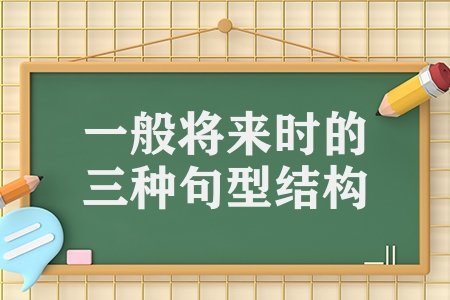一般将来时的三种句型结构(一般将来时的基本用法解读)

一般将来时的构成:
1.肯定句:
① 主语+ be(am/is/are) going to +动词原形
② 主语+will+ 动词原形
例: It is going to rain.
天要下雨了。
I will go shopping tomorrow.
明天我要去购物。
2.否定句:
①主语+ be(am/is/are) not going to+动词原形
②主语+will not(won’t)+ 动词原形
例: She isn’t going to read a book.
她将不读书。
He won’t join us.
他不会加入我们的。
3.疑问句:
① Be(Am/Is/Are)+主语+ going to +动词原形?
② Will+主语+ 动词原形?
简略回答:
(肯)Yes,主语+shall/will.
(否) No,主语 +shall/will not.
例: Are you going to visit her next Sunday?
你下周日将要去拜访她吗?
Will she come to help us?
她将会来帮我们吗?
4.特殊疑问句:
①疑问词+be(am/is/are)+主语+going to +动词原形?
②疑问词+will+主语+动词原形?
例: -----When are you going to go on an outing?
你们将什么时候去郊游?
-----We are going to go on an outing this weekend.
我们将这周末去郊游。
----- Why will you be here on Sunday?
周日你为什么将要在这儿?
-----I will have a meeting on Sunday
我将要在周日举行一个聚会。
一般将来时常用的状语有: tomorrow, next week, from now on, in a month, in the future等。
一般将来时的用法:
1)“ shall/will+动词原形,”表示不含主观因素,单纯的将来。如:
I will be fifteen years next year.
明年我将15岁了。
2)条件句中用will做情态动词表愿意。
If you will wait for me, I shall go with you.
如果你愿意等我,我将和你一起去。
3)用will表示一种倾向或习惯动作。
Crops will die without water.
没有水庄稼会死。
4)“ be going to+动词原形”也是将来时,常表示打算准备做某事,或表示可能要发生或肯定要发生的事情。如:
What are you going to do this evening?
今晚你将干什么?
I am going to call on an old friend of mine.
我将去拜访我的一个老朋友。
It's going to rain.
天将要下雨。
5) be doing限于某些动词。如go,come, leave, start, finish等。
非延续性动词的进行时表示将来时,表示按计划安排要发生的事。
I am finishing my work.
我将要完成工作。
He is coming.
他来了。
They are leaving for Tibet.
他们将要动身去西藏。
6)“be to+动词原形”表示吩咐、命令、约定、计划中的或按职业义务、要求即将发生的动作。如:
He is to give us a talk.
他将要给我们演讲。
Where am I to put these books?
我要把这些书放在哪儿?
7)“ be about to+动词原形”表示“就要……正要…”。在这种情况下一般不可与时间状语连用。如:
We are about to leave, so there is no time to visit him now.
我们马上要离开,因此现在没有时间拜访他。
The meeting is about to begin
会议马上开始。
相关问答
-
家境一般如何出国留学

现在在我们国家,选择出国留学的学生是越来越多了的。出国留学是一种全新的学习和生活体验,可以提高自身竞争力和素质。 下面是小编
阅读更多 -
大学毕业时间一般是几号(大学毕业时间是几月)

大学生毕业是几月几号可以填写6月30号,也可以填7月几号,具体根据自己的学校实际情况为准。通常情况下是六月底至七月初发放,但每个学
阅读更多 -
国考考完一般多久出成绩呢

国考考完一般多久出成绩呢?国考试结束一般40多天左右出成绩。参加国家公务员考试的报考者可在指定日期内,登陆考录专题网站查询笔试
阅读更多 -
国考成绩一般什么时候出来

国考成绩一般在笔试后1个月左右出,比如2024年国家公务员考试笔试时间在2023年11月25日至26日,笔试成绩会在2024年1月份公布。国考成
阅读更多 -
国考一般几点会出成绩

国考一般几点会出成绩?国考笔试成绩发布时间一般是下午六点以后。一般来说,注册的时候会注册账号的手机号,收到分数短信通知。国考成
阅读更多 -
2024年国考面试一般会问什么

国考面试是选拔公务员的重要环节,面试问题小编整理的通常涉及以下几个方面:1.自我介绍:这是面试的开场白,考官通常会要求考生进行简短
阅读更多
最新问答
-

2024年内蒙古公务员考试资格复审公告
2024-04-26 -

神舟十八号乘组名单简介
2024-04-26 -

2024年海南中高考报名人数
2024-04-26 -

上海普通话水平考试报名条件
2024-04-26 -

PETS全国英语等级考试考生须知
2024-04-26 -
山东高考录取批次分数线划定及志愿设置公布
2024-04-26 -

神舟十八号载人飞船航天员简介
2024-04-26 -

五年级上册英语第一单元知识点
2024-04-26 -

小学五年级上册英语第三单元知识点
2024-04-26 -

五年级上册英语第四单元知识点总结
2024-04-26
